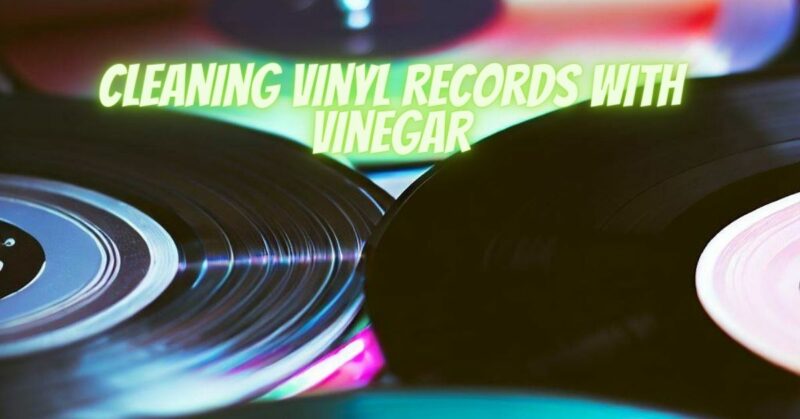Vinegar is a common household ingredient that some vinyl enthusiasts use for cleaning their records. It is known for its natural cleaning properties and affordability. In this article, we will explore the use of vinegar for cleaning vinyl records, including its benefits, potential risks, and best practices to ensure safe and effective record cleaning.
- Benefits of Cleaning with Vinegar: Vinegar offers several potential benefits for cleaning vinyl records:
a. Gentle Cleaning: Vinegar has mild cleaning properties, making it suitable for removing light dust, dirt, and some contaminants from the record surface.
b. Natural and Affordable: Vinegar is an eco-friendly and cost-effective alternative to specialized record cleaning solutions. It is readily available in most households and can be a convenient option for regular maintenance cleaning.
c. Non-Abrasive: When used correctly, vinegar can be non-abrasive, which helps protect the delicate vinyl surface and prevents unnecessary wear.
- Risks and Considerations:
a. Concentration: Vinegar should be diluted before use. Using undiluted vinegar can be too acidic and potentially damage the record surface. It is recommended to dilute vinegar with distilled or deionized water in a ratio of 1:10 (vinegar to water).
b. Label and Adhesive Removal: Some records may have adhesive labels or stickers. While vinegar can help loosen the adhesive, it may not be sufficient for complete removal. Be cautious when attempting to remove labels with vinegar, as excessive moisture can damage the record label or cause warping.
c. Prolonged Exposure: Prolonged or excessive exposure to vinegar can potentially affect the record surface, cause warping, or damage the label. Limit the contact time of vinegar with the record surface and ensure thorough rinsing afterward.
d. Vinyl Sensitivity: Some vinyl formulations may be more sensitive to acidic solutions like vinegar. If you are unsure about the vinyl composition of your records, it is advisable to conduct a small test patch on a less important record before applying vinegar to your entire collection.
- Best Practices for Cleaning with Vinegar:
a. Dilution and Application: Dilute vinegar with distilled or deionized water in a ratio of 1:10 (vinegar to water) in a spray bottle or container. Lightly spray or apply the diluted vinegar solution onto a soft, lint-free cloth or record cleaning brush. Gently wipe the record surface in a circular motion, following the grooves. Avoid excessive moisture or soaking the label area.
b. Rinsing: After cleaning with the vinegar solution, rinse the record thoroughly with distilled or deionized water to remove any residue or remaining vinegar. Ensure the record is completely dry before playback.
c. Drying and Storage: Allow the record to air-dry completely in a dust-free environment. Avoid exposing the record to direct sunlight or excessive heat during the drying process. Once dry, store the record in a clean and protective sleeve to maintain its cleanliness.
- Alternatives and Specialized Cleaning Solutions: While vinegar can be effective for routine maintenance cleaning, it may not be sufficient for heavily soiled or contaminated records. In such cases, consider using dedicated record cleaning solutions or enzymatic cleaners that are specifically formulated for vinyl records. These products offer stronger cleaning capabilities and are designed to address specific cleaning challenges.
Conclusion:
Vinegar can be a suitable option for cleaning vinyl records when used correctly and with proper dilution. It offers gentle cleaning properties and can be an affordable and accessible alternative to specialized record cleaning solutions. However, it is important to be mindful of the risks and considerations associated with vinegar, including proper dilution, label and vinyl sensitivity, andthe potential for prolonged exposure. Following best practices, such as diluting vinegar, gentle application, thorough rinsing, and proper drying, can help minimize risks and ensure effective cleaning. If you encounter heavily soiled or contaminated records, it may be advisable to explore dedicated record cleaning solutions or seek professional assistance. By approaching record cleaning with care and understanding the limitations and considerations of using vinegar, you can maintain the cleanliness and sound quality of your vinyl records for long-lasting enjoyment.


